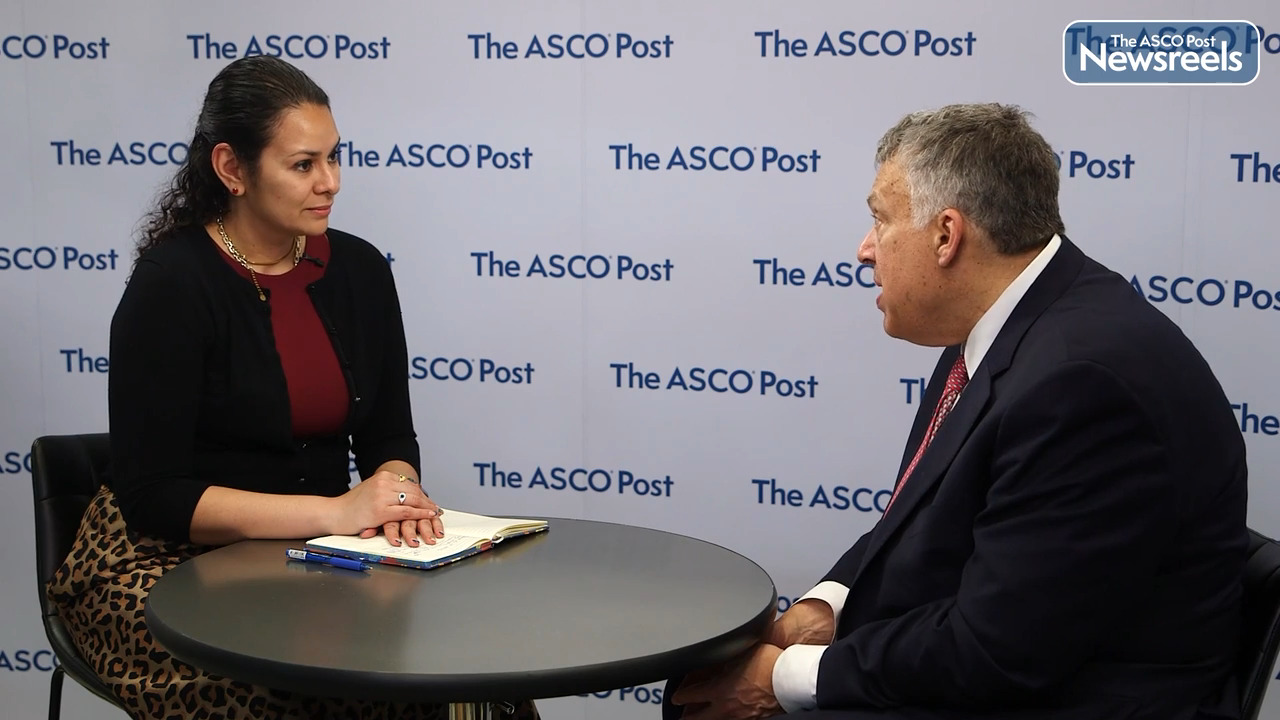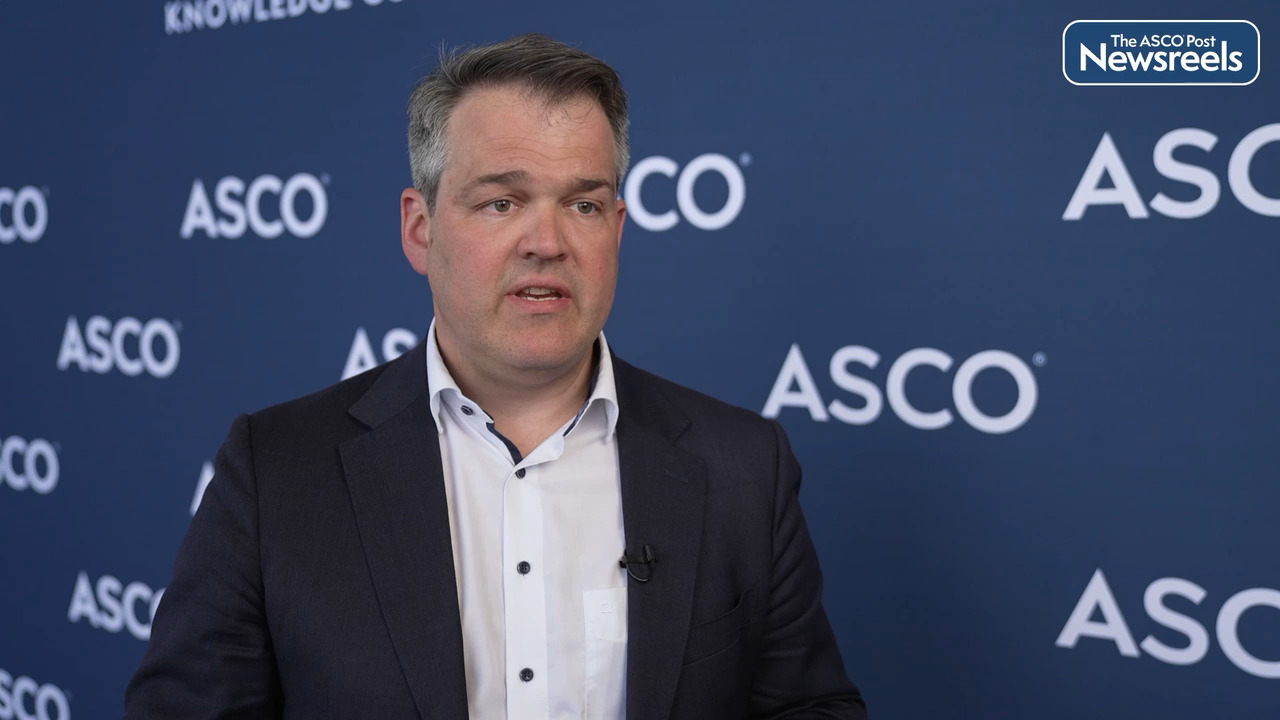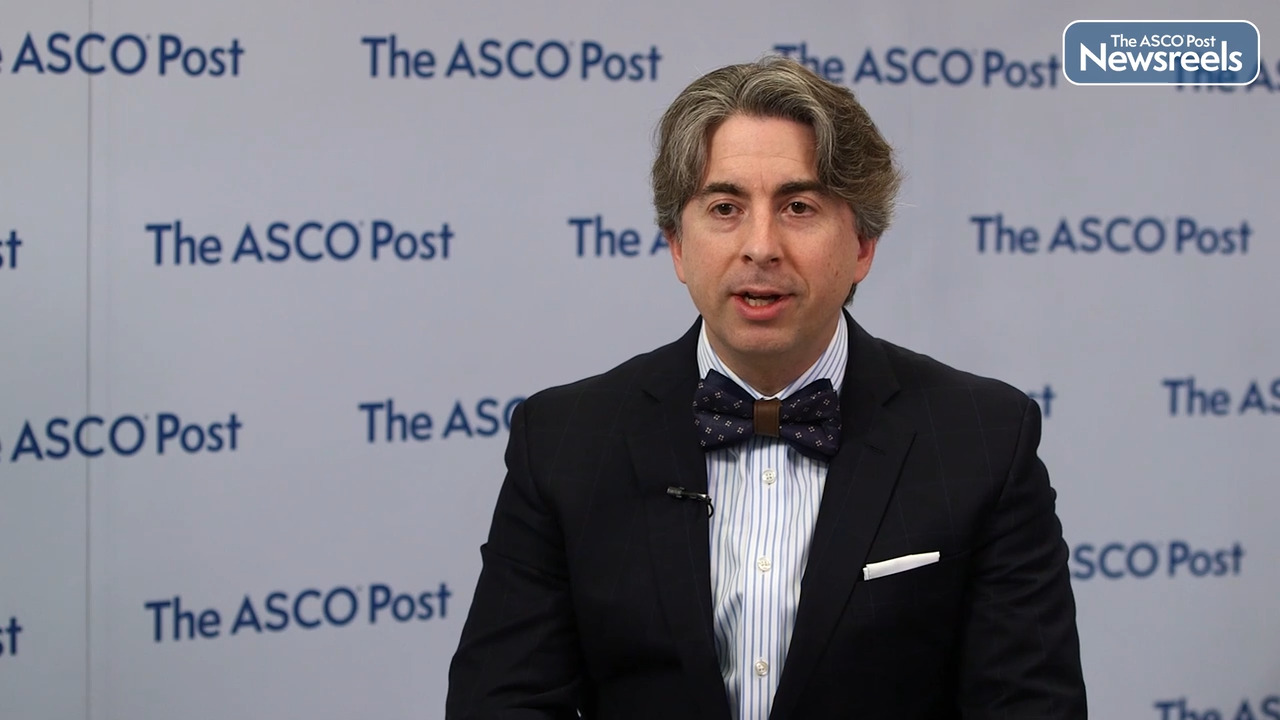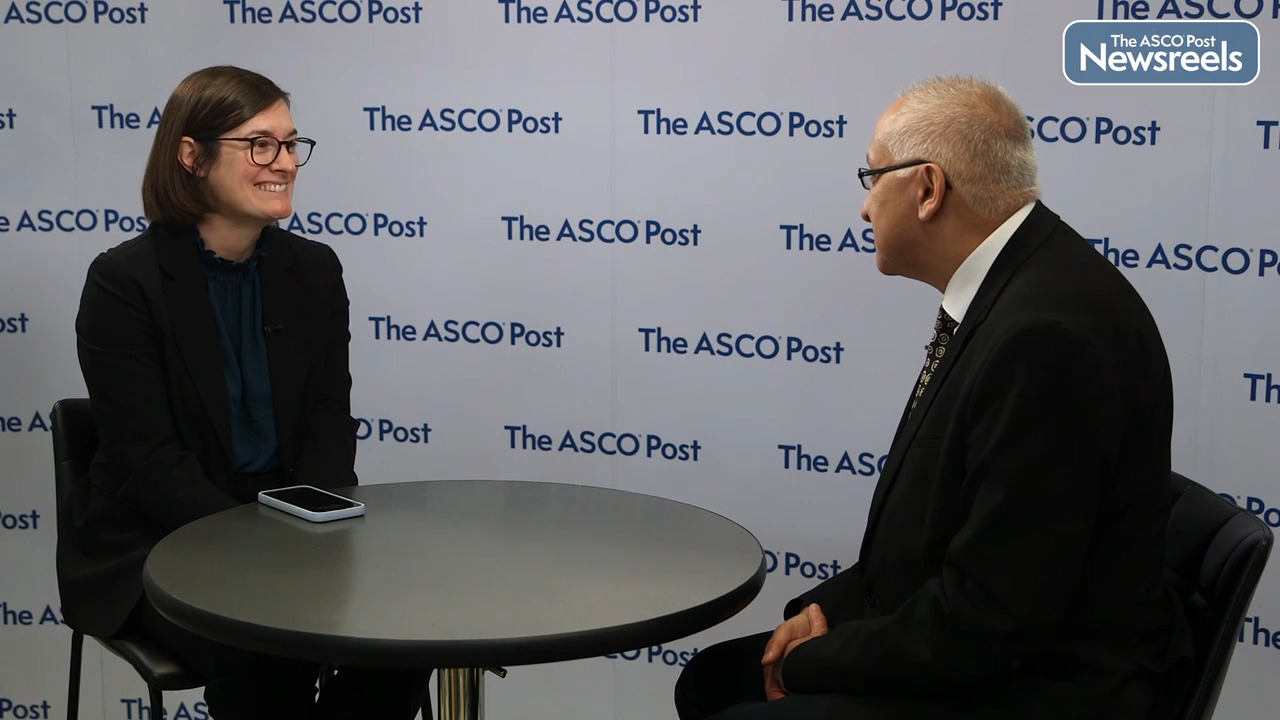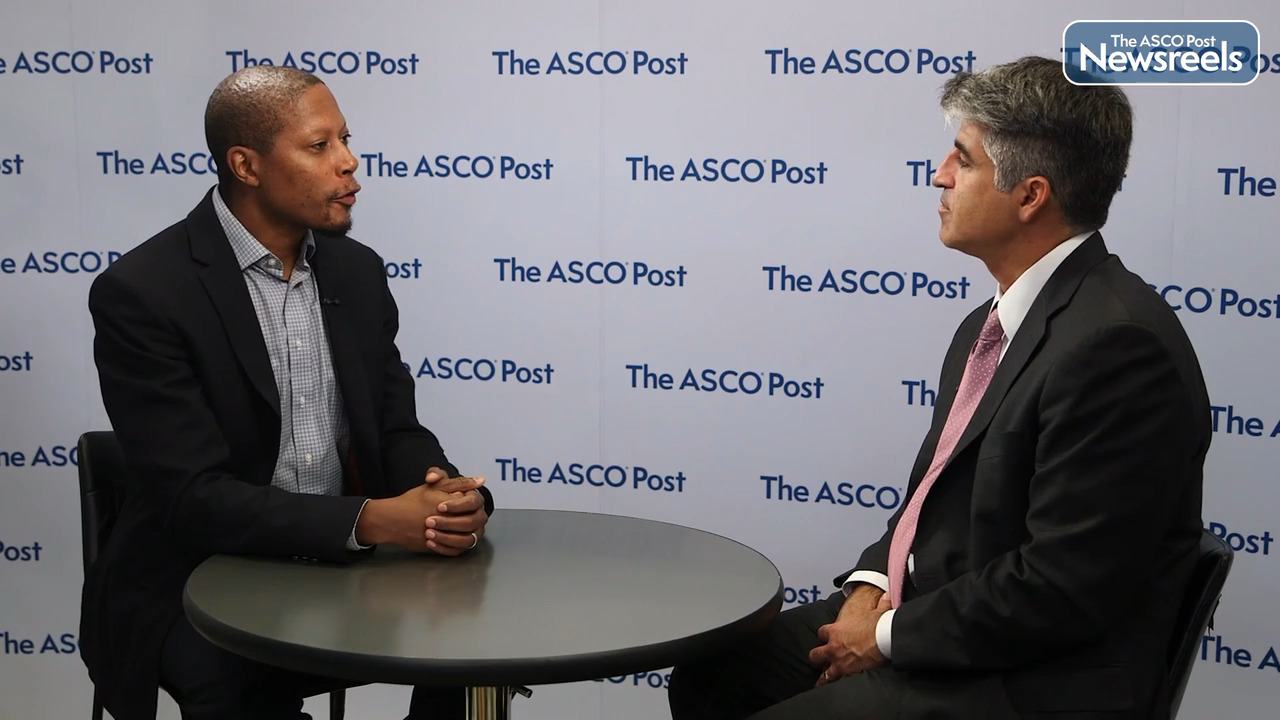Muhit Özcan, MD, on DLBCL: Early Results on Zilovertamab Vedotin
2023 ASCO Annual Meeting
Muhit Özcan, MD, of Turkey’s Ankara University School of Medicine, discusses phase II findings from the waveLINE-004 study. It showed that the antibody-drug conjugate zilovertamab vedotin had clinically meaningful antitumor activity in patients with relapsed or refractory diffuse large B-cell lymphoma (DLBCL) who experienced disease progression after, or have been ineligible for, autologous stem cell transplantation and/or chimeric antigen receptor T-cell therapy (Abstract 7531).
Transcript
Disclaimer: This video transcript has not been proofread or edited and may contain errors.
Muhit Özcan, MD:
Treatment options are limited for patients with relapsed or refractory diffuse large B-cell lymphoma who are ineligible for or who have disease progression after autologous stem cell transplant and CAR T-cell therapy. ROR1 is an oncofetal transmembrane protein that's expressed in various hematological malignancies, including diffuse large B-cell lymphomas. Zilovertamab vedotin is an antibody drug conjugate compressing an anti-ROR1 monoclonal antibody plus a cleavable linker and the anti-microtubule cytotoxin monomethyl auristatin E.
Here, we present early results from the single-arm, open label, phase-II waveLINE-004 study, which is designed to evaluate the efficacy and safe zilovertamab vedotin in patients with relapsed or refractory diffused large B-cell lymphoma who are ineligible for or who have disease progression after autologous stem cell transplant or after CAR T-cell therapy.
Patients in waveLINE-004 received zilovertamab vedotin at 2.5 milligram per kilogram intravenously every three weeks. The primary endpoint was objective response rate, and the secondary endpoint was safety and tolerability. Safety was evaluated in all patients who received at least one cycle of study treatment, and efficacy was evaluated in all patients who received at least one dose of study treatment and had at least three months of follow-up.
At the data cut-off, 40 patients had received treatment. The median age of patients was 68 years, 60% of patients had received three or more prior lines of therapy, 25% of patients had undergone prior stem cell transplant, and 28% of them had undergone prior CAR T-cell therapy. The objective response rate among the 20 patients with at least three months follow up was 30%, with two patients achieving a complete response and four patients achieving a partial response. An additional five patients had stable disease for a disease control rate of 55%, 95% confidence interval, 31.5 to 76.9%. Five patients had progressive disease and four patients could not be assessed.
When change in target lesion size was evaluated, 13 or 20 patients had any reduction from baseline, and seven patients had a reduction in target lesion size of 50% or more. Treatment-related adverse events of any grade occurred in 70% of patients, most commonly diarrhea in 23, anemia in 20, neutropenia in 18, and neutrophil count decrease in 18% of patients. Grade 3 or 4 treatment-related adverse events occurred in 40% of patients and no that's due to treatment-related adverse events occurred. One patient discontinued treatment because of grade 3 treatment-related ketoacidosis. Treatment-related peripheral neuropathy occurred in 15% of patients over grade 1 or 2. No infusion-related reactions or treatment-related tumor lysis syndrome occurred.
In summary, these earlier results from waveLINE-004 showed that zilovertamab vedotin had clinically-meaningful antitumor activity and manageable safety in patients with relapsed or refractory diffused large B-cell lymphoma who are ineligible for or who have had disease progression after autologous stem cell transplantation or after CAR T-cell therapy. These results support the continued investigation of zilovertamab vedotin in patients with relapsed or refractory diffused large B-cell lymphoma.
Related Videos
The ASCO Post Staff
Narjust Florez, MD, of Dana-Farber Cancer Institute, and Roy S. Herbst, MD, PhD, of Yale Cancer Center, discuss new phase III findings on osimertinib, a third-generation, central nervous system EGFR-TKI, which demonstrated an unprecedented overall survival benefit for patients with EGFR-mutated, stage IB–IIIA non–small cell lung cancer after complete tumor resection, with or without adjuvant chemotherapy (Abstract LBA3).
The ASCO Post Staff
Sebastian Stintzing, MD, of the Charité Universitätsmedizin Berlin, discusses results from the phase III FIRE-4 study, which showed that liquid biopsy is clinically relevant in verifying mutational status in patients with metastatic colorectal cancer and is efficacious in first-line treatment of FOLFIRI and cetuximab for patients with RAS wild-type disease (Abstract 3507).
The ASCO Post Staff
Jason J. Luke, MD, of the University of Pittsburgh Medical Center Hillman Cancer Center, discusses adjuvant pembrolizumab, which, in previous results, improved distant metastasis– and recurrence-free survival in patients with resected stage IIB or IIC melanoma vs placebo. After a median follow-up of 39.4 months, adjuvant pembrolizumab continued to show a benefit over placebo, with no new safety signals (Abstract LBA9505).
The ASCO Post Staff
Bobbie J. Rimel, MD, of Cedars-Sinai Medical Center, and Mansoor R. Mirza, MD, of Denmark’s Rigshospitalet and Copenhagen University Hospital, discuss new findings on dostarlimab-gxly plus carboplatin/paclitaxel, which improved progression-free survival while maintaining health-related quality of life, further supporting its use as a standard of care in primary advanced or recurrent endometrial cancer (Abstract 5504).
The ASCO Post Staff
Tycel J. Phillips, MD, and Alex F. Herrera, MD, both of the City of Hope National Medical Center, discuss findings from the POLARIX study, which provided the largest prospectively collected circulating tumor DNA (ctDNA) data set on patients with previously untreated diffuse large B-cell lymphoma. Achieving ctDNA-negative status was associated with improved outcomes when patients were treated with polatuzumab vedotin-piiq plus combination chemotherapy vs combination chemotherapy alone (Abstract 7523).
